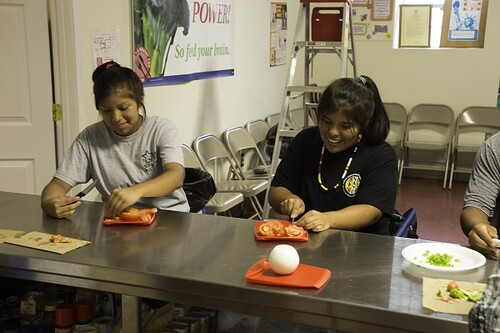
FDPIR provides healthy food and nutrition education to an average of 92,500 income-eligible individuals living on or near reservations across the United States each month.
March is National Nutrition Month. Throughout the month, USDA will be highlighting results of our efforts to improve access to safe, healthy food for all Americans and supporting the health of our next generation.
In Indian Country, culture and tradition are sustained through shared meals with family and the community. Traditional foods are a powerful way for each new generation to connect with and honor its history and its ancestors.
Bison and blue cornmeal have recently graced the tables of participants in USDA’s Food Distribution Program on Indian Reservations (FDPIR) thanks to the joint commitment of the Agricultural Marketing Service and Food and Nutrition Service, working with the FDPIR community to identify and procure foods traditional to many tribes. Last year, AMS awarded two contracts to Native American-owned small businesses to deliver frozen, lean ground bison meat to FDPIR. From November 2015 to the end of June 2016, these companies are on schedule to deliver a total of 520,000 pounds of bison meat. A third contract was awarded for whole-grain blue cornmeal. This product was received by tribes during the 2015 holiday season for use in a wide variety of recipes and cultural dishes.
Beyond these traditional foods, the number of FDPIR specialty items has increased through the addition of two fresh seasonal produce options. Participants began receiving fresh cranberries and clementines during the holiday season through the Department of Defense (DoD) Fresh Fruit and Vegetable Program.
FDPIR provides healthy food and nutrition education to an average of 92,500 income-eligible individuals living on or near reservations across the United States each month. The food package offers more than 100 domestically sourced, nutritious foods, including a variety of meat, poultry, fish, dairy, grains, and fruits and vegetables.
Since 2008, FDPIR Nutrition Education (FDPNE) Grants have offered Indian Tribal Organizations (ITOs) and state agencies who administer FDPIR the opportunity to apply for funding to conduct nutrition education activities for FDPIR and FDPIR-eligible participants. Possibilities include cooking demonstrations, classes on creating affordable meals with USDA Foods, and gardening and physical activity projects with a nutrition education component. Previous grantees include the Mississippi Band of Choctaw Indians, who hosted a summer program teaching children about fruits and vegetables through hands-on garden tours and recipe preparation, and the Menominee Indian Tribe of Wisconsin, who offered a monthly cooking class teaching basic culinary skills and food safety along with interactive games to reinforce each lesson theme.
The USDA commitment to promoting access to nutritious, traditional foods through FDPIR continues with a $5 million request in the Fiscal Year (FY) 2017 President’s Budget, matching the annual amount dedicated to traditional and locally-grown foods in both FY 2015 and FY 2016. The provision for this traditional foods fund is authorized under the Farm Bill and is subject to the availability of appropriations. The President’s FY 2017 Budget includes an additional $2 million request for a 2014 Farm Bill-authorized FDPIR traditional and local foods demonstration grant project, which if appropriated would allow one or more ITOs, rather than USDA, to procure traditional foods for distribution to FDPIR recipients.
Another notable item in the President’s Budget request for FY 2017 is a $5 million increase in FDPIR administrative funding, due to significantly increased participation in recent years. If appropriated by Congress, the increased amount would contribute towards maintaining food distribution sites featuring one or more warehouses, certification stations, and activities for out-bound food delivery to remote sites and home-bound clients. Program operators may also use administrative funds to meet infrastructure and equipment needs, such as freezers and coolers, forklifts and pallet jacks, flooring and roof repairs, and refrigerated trucks for delivery to remote locations.
Though it remains to be seen what Congress will provide for FDPIR in FY 2017, the budget request shows a strong commitment to FDPIR by the administration, including USDA.
From bison and blue cornmeal to cranberries and clementines, USDA has expanded the special options available to FDPIR through traditional and seasonal offerings. To complement the food provided through FDPIR, USDA is also seeking to invest in nutrition education and infrastructure, building on the Farm Bill and creating a holistic approach to increase food security in Indian Country.
No comments:
Post a Comment